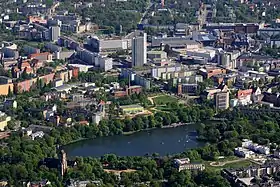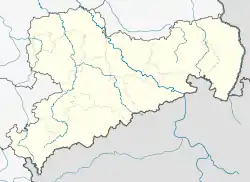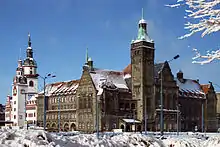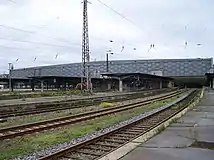Chemnitz
Chemnitz is a city in Germany. It is in the state of Saxony. In 2006, about 245,000 people lived there.
Chemnitz | |
|---|---|
    From top: View over Chemnitz, Red tower, Old Town Hall, Modern city centre of Chemnitz | |
 Flag  Coat of arms | |
Location of Chemnitz | |
 Chemnitz  Chemnitz | |
| Coordinates: 50°50′N 12°55′E | |
| Country | Germany |
| State | Saxony |
| District | Urban districts of Germany |
| Government | |
| • Mayor | Barbara Ludwig (SPD) |
| Area | |
| • Total | 220.85 km2 (85.27 sq mi) |
| Elevation | 296 m (971 ft) |
| Population (2022-12-31)[1] | |
| • Total | 248,563 |
| • Density | 1,100/km2 (2,900/sq mi) |
| Time zone | UTC+01:00 (CET) |
| • Summer (DST) | UTC+02:00 (CEST) |
| Postal codes | 09001–09247 |
| Dialling codes | 0371
037200 (Wittgensdorf) 037209 (Einsiedel) 03722 (Röhrsdorf) 03726 (Euba) |
| Vehicle registration | C |
| Website | www |
During the partition of Germany Chemnitz was in East Germany. From 1953 to 1990 Chemnitz was called Karl-Marx-Stadt. The name was in reference to the social reformer Karl Marx. Now the city has its old name. This name is from the river that flows through it.
The first mention of the city was in 1143. The city had an important role in the Industrial Revolution. In about 1883, the city population passed 100.000 inhabitants.
Geography
Chemnitz is north of the Ore Mountains in the western part of the Bundesland Saxony. It is the 3rd biggest city in Saxony with about 245.000 inhabitants. The area is about 220 km2. There is a river that is also called Chemnitz. The average temperature is 8 °C and the amount of rain and snow every year (annual precipitation) is 700 mm.
Sights
The Karl-Marx-Monument has been an attraction of the city since 1971. The 7,10 meter high statue was created by the Russian artist Lev Kerbel. The inhabitants of Chemnitz call it "Nischel", which means head in the dialect of the area.
The Roter Turm (the red tower)is one of Chemnitz's oldest sites; it was built in the 12th or 13th century and was once part of the city wall.

The town hall of Chemnitz consists of two buildings. The old town hall was built in the 15th century. The new townhall, on the other hand, was built at the beginning of the 20th century and was designed by Richard Möbius. The new town hall was erected next to the old one.
One of the new attractions of the city is das Tietz. The former department store was constructed in 1912/1913. Today the Museum for Natural History, the public library, an adult education centre, a gallery and the Petrified Forest are here.
Railway

Chemnitz had an ICE connection for a short time, until 2006. Chemnitz is part of the railway line Dresden - Chemnitz - Hof - Nuremberg which is called 'Franken - Sachsen - Magistrale'. Today an InterRegioExpress services Dresden, Nuremberg and Leipzig. There are regional train (RegionalBahn) connections to the Ore Mountains and to Elsterwerda.
Main roads
Here are listed on the most important roads of the metropolitan:
- A 4 : Highway, Frankfurt - Giessen - Erfurt - Chemnitz - Dresden - Görlitz - Wroclaw - Kraków
- A 72: Highway, Hof - Zwickau - Chemnitz - Geithain ( - Leipzig)
- B 95: federal highway, Annaberg-Buchholz - Chemnitz - Borna - Leipzig
- B 107: federal highway, Pritzwalk - Dessau - Grimma - Chemnitz

- B 169: federal highway, Neuensalz - Chemnitz - Riesa - Elsterwerda - Cottbus
- B 173: federal highway, Bad Staffelstein - Hof - Chemnitz - Dresden
- B 174: federal highway, Marienberg (Ore mountains) - Chemnitz
Public transport
Chemnitz has got a big tram and a big bus network. There are 6 tram lines and 25 (+1 at fair days) bus lines. These networks belong to CVAG, the transport companies of Chemnitz.
References
- "Einwohnerzahlen nach Gemeinden als Excel-Arbeitsmappe" (XLS) (in German). Statistisches Landesamt des Freistaates Sachsen. 2024.
Other websites
![]() Media related to Chemnitz at Wikimedia Commons
Media related to Chemnitz at Wikimedia Commons